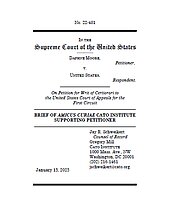An evenly split First Circuit was unable to definitively answer whether the ATF’s investigation violated the Fourth Amendment. The judges on both sides of this split attempted to faithfully apply current doctrine to the facts of Moore’s case, but none applied the Fourth Amendment’s explicit terms. They instead followed the “reasonable expectation of privacy” test endorsed by the U.S. Supreme Court. According to that test, as set out in Justice Harlan’s concurring opinion in Katz v. United States (1967), a search occurs when government action upsets a reasonable expectation of privacy.
Ms. Moore has filed a petition to the Supreme Court. Building on our brief in Tuggle v. United States (2021), the Cato Institute submitted an amicus brief in support, in which we argue that the Court should abandon analyzing Fourth Amendment searches and seizures under the “reasonable expectation of privacy test.” Instead, the Court should hew more closely to the actual text of the Fourth Amendment, which ensures that “The right of the people to be secure in their persons, houses, papers, and effects, against unreasonable searches and seizures, shall not be violated.” Courts should therefore ask the following series of questions: Was there a search? A seizure? Was any search or seizure of their persons, houses, papers, or effects? Was any such search or seizure reasonable?
In this case, the ATF’s surveillance of Ms. Moore’s home was undoubtedly a search, on an ordinary, common-sense understanding of that term. A search is looking over or through something with a purpose of finding or uncovering information. Here, the highly directed and persistent observation of Ms. Moore at her home is a “search” for evidence against her in the natural sense of that term. The ATF’s search was almost certainly unreasonable as well. For months, the ATF intentionally and pervasively pried into the details of Ms. Moore’s life at home without any judicial supervision and with no justification for failing to procure a warrant other than pure convenience. But pure convenience cannot be a constitutionally adequate justification to avoid the protections of the Fourth Amendment. To stabilize courts’ application of the Fourth Amendment and better position them to assess “high-tech” cases, we urge the Court in our brief to grant the petition and adopt a framework that hews more faithfully to the language, meaning, and structure of the Fourth Amendment.


